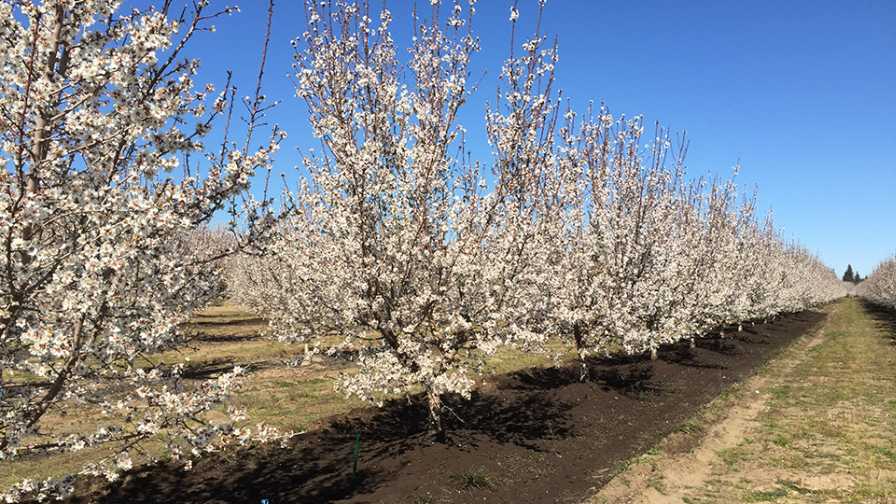Compost May Not Improve Almond Orchards

Ten tons of composted green waste is applied annually to almond orchards in California. Prior to planting, 30 tons of compost per acre is applied in a concentrated, 4-foot-wide band down future tree rows.
Photo by Roger Duncan
Many studies have shown that soil applications of composted green waste or manure can increase the diversity and activity of soil microorganisms, soil water-holding capacity, nutrients such as potassium and nitrogen, humic acid, organic matter, and carbon sequestration. Although most compost studies focus on improvements in soil health, few if any trials have tested if compost actually enhances almond orchard performance or increases profits.
The current cost for purchase, delivery, and application of composted green waste in California’s Northern San Joaquin Valley is approximately $27 to $30 per ton. Common application rates range between 5 and 10 tons of compost per acre, representing a significant investment to the grower. It is important to determine if almond growers can improve tree performance enough to recover such a substantial input cost.
In a Stanislaus County trial, we worked with a local nursery to determine if applying composted green waste prior to planting is beneficial when establishing an almond orchard and, if so, which rate might be best. The field was a sandy loam soil where a vineyard had been removed the previous year and the soil was fumigated. Prior to planting, composted green waste was applied at 0, 5, 10, 20, or 30 tons to the acre in a concentrated, 4-foot-wide band down the future tree rows.
The compost was then incorporated into the soil, and potted trees were planted in May 2017. The orchard was fertilized and irrigated according to the grower’s normal farming practices. The trees were monitored for two years, recording tree growth, leaf nutrients, and stem water potential (using a pressure bomb to monitor water stress).
At no time during the two years of the trial did we see or measure any differences in tree performance. Even 30 tons of composted green waste, at a cost of about $800 per acre, had no effect on tree establishment, growth, leaf nutrient content, or tree water status. If the rows weren’t labeled, you would never know which ones had compost and which did not.
TRY, TRY AGAIN
So one application of compost at planting did not affect orchard establishment or longer-term tree performance. What about a compost program in which compost is incorporated at planting time and applied to the soil surface every year for several years? To test this, two replicated field trials were established in 2015 to document the effects of compost and examine the differences between using composted green waste and composted cow manure.
One orchard is in Riverbank on a Hanford sandy loam soil that has not been previously farmed. The test variety is ‘Nonpareil’ on Nemaguard rootstock and is irrigated with full-coverage sprinklers. The second orchard is in North Modesto on very sandy soil in a fumigated replant site following an almond orchard removed the previous fall. This orchard is irrigated with micro sprinklers. The variety is ‘Independence’ on Nemaguard rootstock.
In both locations, 5.2 tons of compost per acre were applied in a concentrated band about 4 feet wide and then incorporated into the soil during planting of the bareroot trees. An additional 0.5 tons per acre was applied to the base of the new trees after one month of growth. Each subsequent spring (2016-2019), approximately 10 tons of composted green waste or manure has been applied to the soil surface in a concentrated band approximately 8 feet wide. Trees are periodically monitored for stem water potential (water stress) and annually for leaf nutrients, nematodes, growth, and yield.
Composted green waste and manure both slightly increased July leaf levels of chloride and nitrogen. Leaf calcium was significantly lower in the compost treatments. Potassium was increased in the composted manure treatment but not the green waste treatment. No other significant changes in leaf nutrients occurred.
After five years of study, the application of composted green waste or manure has not increased growth or yield of almond trees whether grown in excellent first-generation orchard soil or very sandy second-generation orchard soil. Stem water potential measurements with a pressure bomb have shown that trees in compost areas have not had less water stress than without compost.
Compost treatments have not reduced pathogenic nematode numbers.










